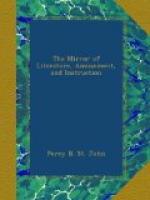* * * * *
AMERICAN LAW.
“No commentator,” says Judge Hall, in his Letters from the West, “has taken any notice of Linch’s Law, which was once the lex loci of the frontiers. Its operation was as follows:—When a horse thief, a counterfeiter, or any other desperate vagabond, infested a neighbourhood, evading justice by cunning, or by a strong arm, or by the number of his confederates, the citizens formed themselves into a “regulating company,” a kind of holy brotherhood, whose duty was to purge the community of its unruly members. Mounted, armed, and commanded by a leader, they proceeded to arrest such notorious offenders as were deemed fit subjects of exemplary justice; their operations were generally carried on in the night. Squire Birch, who was personated by one of the party, established his tribunal under a tree in the woods, and the culprit was brought before him, tried, and generally convicted; he was then tied to a tree, lashed without mercy, and ordered to leave the country within a given time, under pain of a second visitation. It seldom happened that more than one or two were thus punished; their confederates took the hint and fled, or were admonished to quit the neighbourhood.”
* * * * *
MONUMENTAL ALTERATION.
The following odd story is related respecting a monument in a chapel, adjoining Stene, a fine family seat in the north:—The sculptor, in that vile taste which seems to have originated in an unhappy design of making every thing connected with the grave revolting to our feelings, had ornamented this monument with “a very ghastly, grinning alabaster skull;” and the bishop one day expressed a wish to his domestic chaplain, Dr. Grey, that it had not been placed there. Grey, upon this, sent to Banbury for the sculptor, and consulted with him whether it was not possible to convert it into a soothing, instead of a painful object. After some consideration, the artist declared that the only thing into which he could possibly convert it was—a bunch of grapes! and accordingly, at this day, a bunch of grapes may be seen upon the monument; for the chapel, which for a time had been abandoned to the rooks and daws who built their nests among the monuments, has been repaired, and is now united to the rectory of Hinton.
* * * * *
It is easier to induce people to follow than to set an example—however good it may be both for themselves and others, most men have a silly squeamishness about proposing an adjournment from the dinner table. The host, fearing that his guest may take it for a token that he loves his wine better than his friends, is obliged to feign an unwillingness to leave the bottle, and, as Sponge says—“In good truth, ’tis impossible, nay, I say it is impudent, to contradict any gentleman at his own table; the president is always the wisest man in the party.”




